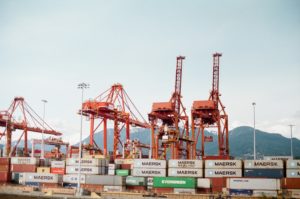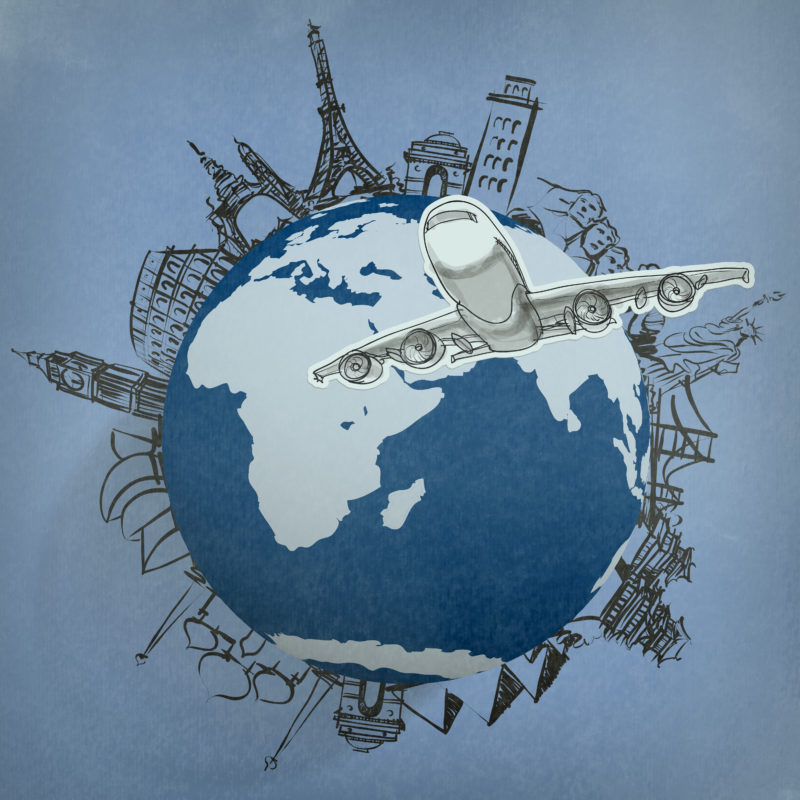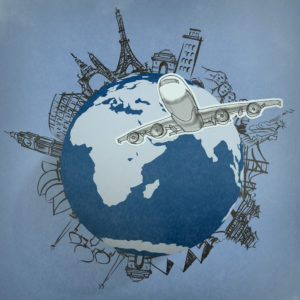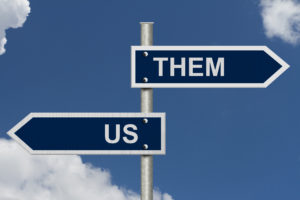More and more international companies continue to trade because we are in the Golden Age of Globalization, too. What is globalization? It’s a growing interdependence of countries on one another for trade in goods and services. And it enables the free movement of people, culture, and information. Despite all this, there have been myths growing about globalization, obscuring what it means, and how it works.
As Thomas L. Friedman describes in his book, The World Is Flat, technology continues to level the international playing field. Barriers to entry become increasingly smaller. We now live in a global world, connected by the internet, technology, social media, and other interfaces that make competition much easier.
Yet, globalization is also a double-edged sword…
While much of the world moves forward, eager to grow and interact, many other groups feel as though they’re being left behind. As a result, people lash out against the gradual washing away of borders. And this has led some to be overly critical of the process.
Luckily, with a thorough understanding of globalization’s origins, its benefits, and its downsides, the polyglot can understand globalization’s influence and how it sets the stage for rapidly budding interest in foreign language acquisition. And by digging a little deeper, you find that one easily accessible solution to all these issues rests in language-learning.

History of Globalization
Ramping up in the 1800s with the industrial revolution, globalization eventually came to a halt with the first World War. Protectionism, the Great Depression, and the Second World War held it back for years. It wasn’t until after WW2, with help from the US, that international trade ramped up again. The belief was that a world connected through economies would be less likely to wage war. Still, it wouldn’t be until after the end of the Cold War that globalization would finally hit its stride.
Globalization established organizations like the International Monetary Fund (IMF), United Nations (UN), World Bank, World Trade Organization (WTO), and North Atlantic Treaty Organization (NATO). These organizations brought countries closer together to help create a better standard of life for people all over the world. And their reach would continue to grow. Their main goal? Casting light on issues that affected smaller populations of people in the world.
Quick Statistics About Globalization
According to the UN, “Globalization and increased economic interdependence have accompanied — and facilitated — rapid economic growth in many countries and regions, helping world GDP grow from around 50 trillion USD in 2000 to 75 trillion USD in 2016.” But there’s more to consider than GDP when analyzing the impact of globalization. And as you’ll quickly see, there are both positives and negatives to consider:
- On average, 60% of the services provided and products created globally move across a country’s borders at some point.
- Per capita, the gross domestic product increases by 0.33% points every time the globalization index increases 1 point.
- 2/3rds of international trade comes from around 500 corporations
- Since WW2, international trade has increased 12x with an expected annual increase for the next 10 years of 6%.
- Countries without access to the world economy experience a widening gap in GDP.
- Global literacy rose from 12% in 1820 to 86% in 2015.
- Between 2000 and 2016, average life expectancy around the world increased by 5.5 years.
- Roughly 25% of manufacturing workers in the US experience a 30% wage drop after being displaced.
- High correlations exist between economic freedom and high-income per capita. Economies with more freedom have an income per capita that is between 2x and 6x higher than countries with restricted or limited economies.

The Benefits of Globalization
As stated earlier, the intention behind globalization after the Second World War was to connect the world through trade. Not only did this create more organizations that focused on the well-being of people around the world, but it fueled a range of lasting, positive side effects. These effects influence everyone from the very poor to the incredibly wealthy.
Cheaper Goods
Globalization means cheaper goods because companies can specialize. Businesses have fixed costs, for example. Whether it’s research and development or overhead, no matter what, these bills need to be paid. However, because globalization opens them up to a larger market, they can become increasingly efficient at specializing in a specific good or service. This lowers the cost of production, and ultimately, the cost of the goods or services.
Increased Innovation
Lowering the cost for companies to produce goods allows them to compete with other companies on a global scale. To stay relevant, companies need to work even harder to find better ways to outpace the competition. As a result, there’s a constant push to improve, dropping costs, improving services, and unlocking innovations.

It ‘s often not cost-effective for businesses to cater to small, niche markets. But when businesses compete, the customers win. Aside from having greater access to high-quality products, they have a greater chance of benefiting from innovations made outside of mainstream interests. With a global market, even the smallest niches can prove profitable.
Higher Standards of Living
Extreme poverty (living on less than $1.90 USD per day) has dropped 35% since 1990. More countries have access to trade, increasing the flow of money through their economies. Combined with cheaper goods and services, lower-income households now find that they can afford daily necessities.
It’s also cheaper for poorer nations to rapidly advance. This is because they can skip steps. Many countries in Africa, for instance, skipped the expense of installing expensive infrastructure for landline-based communications. Instead, most of the population use cell phones.
Global Peace on an Unheard of Scale
While conflict still exists in the world, the fact that we’ve not experienced a major war in over 70 years illustrates how beneficial globalism is for the world as a whole. In fact, we’re living in perhaps the most peaceful time in human existence.

Despite pockets of war throughout the world, conventional warfare between major industrial powers doesn’t just seem unlikely, it’s economically destructive. In short, it’s much cheaper and easier to trade for goods and services than it is to invade and conquer for them.
The Downsides of Globalization
With all the benefits of globalization, it seems absurd to argue against it. Yet, even though it has overwhelmingly positive effects on humanity as a whole, there are certain groups who get left out. And if globalization is going to benefit everyone, these people need to have their concerns addressed along with possible solutions provided.
Loss of Low-Skill Jobs in Developed Nations
Manufacturing jobs are often the first casualties of a globalized world. Between automation and outsourcing, companies find cheaper ways to produce high-quality goods and services so they can remain competitive.
If you look at the US, for example, Peterson Institute found that 156,250 manufacturing jobs were lost each year from 2001 – 2016. This was a result of international trade pushing jobs into countries with lower labor. As a result, Low-wage workers feel the greatest negative impact of globalization.
Side-Effects of Job Displacement
As jobs move to various developing countries, low-skilled workers lose income while having a harder time finding similar jobs with equivalent pay. Unemployment can rise as a result, putting more strain on the welfare programs of these countries. Additionally, the lack of jobs means governments lose out on taxing that income.

People who lose their jobs due to displacement can end up resenting both globalization and foreigners. Despite having the same goals, these irritations can manifest into lasting barriers that shut down communication between people. Add to that the language barriers that exist between people of different regions and tensions can continue to rise.
Major Corporations Benefit the Most
Perhaps the biggest argument against globalization is that it benefits major corporations the most. Of the top 100 revenue generators in the world, 71 are corporations. Corporations can grow rapidly with low overheads and high profit margins. With seemingly endless resources, they can hire the political influence needed to sway governments.
While people in developing areas can benefit from access to global markets, a majority of profits get funneled into these major corporations, allowing them to further extend their reach. Sadly, globalization tends to have a mixed effect on local businesses, average workers, local communities. Some benefit, and others flounder and fall in a global economy.
Economies Become Intertwined
Any global economy is deeply interconnected. As a result, effects can resonate on a global scale. During 2008’s financial crisis, the world experienced a major economic downturn. Countries like Greece, Spain, and Ireland experienced detrimental economic side-effects from the crash, forcing them to seek support from the EU. The fallout from the economic crash caused ripples throughout the world economy.
Fading Cultural Identities
There’s also an increase in the homogenization of culture due to the constant influence of major corporations. These industries push ideologies and values onto a global population, restructuring their daily lives. It’s easy to grab a Starbucks coffee in Italy, buy Nike’s in England, and upgrade to a new iPhone in Germany. As a result, some populations feel that these corporations are swallowing up their identities, leaving a growing mound of products in its place.

Globalization’s Impact on Culture Awareness
Globalization has made significant social progress possible, specifically, in the treatment of minority groups. But, there’s also a greater sense of awareness of one’s place in the world and the responsibility each one of us has. Advances in technology, travel, and mass communication have opened doors to cultures and people that were inaccessible before. These people and their struggles have been exposed, providing perspective while demanding action.
Some arguments against globalization state that the ease at which one can acquire a Pumpkin Spiced Latte and new pair of Nikes while Snapchatting it on the latest iPhone means that whole cultures will inevitably be wiped out. However, that fails to take into account how much more exposure other cultures gain from globalization. Food, fashion, and ideas move both ways between cultures as a result of globalization. And these touchpoints create incredible opportunities for people to intermingle, share, and grow more connected.
Technology’s Role in Globalization
The internet encapsulates this idea perfectly. Before, you had to watch whatever was on the TV, hoping for some genuine insight into the world. You were left to interpret the words of reporters interviewing people on the ground where things were happening. Now, you have choices.
With a few clicks, you can listen to people describe their culture and experiences all over the internet. They can share their languages and ideas. They can connect with you, even if only on a digital level, through various social mediums. A simple “like” or comment can transform a distant person into a nearly tangible being. And their ideas become all the more interesting and important to your life.
What’s at the center of all this? The proliferation of that technology made possible by globalization.

Suddenly, your neighborhood isn’t just a collection of corporate fast food joints and outlet malls. Now, you’ve got a range of cuisines inspired by people all over the world. You have products for sale from distant lands. And you have increasing collections of immigrants reaching out into new neighborhoods, connecting with people in a way that wouldn’t have been possible without globalization.
Some Doors Remain Closed: Fixing Globalization’s Problems
Still, there are some heavy drawbacks to globalization that need to be addressed. It is inevitable. Every day we get inextricably more connected to each other’s lives. Technology will continue to push people closer together. After all, the market often leads the way. And as long as people desire cheaper products, crave technological advances, and stay curious about the lives of others, we’ll continue on this path.
Any solution to globalization needs to let go of trying to prevent it. Instead, it needs to focus on how to break down barriers. It needs to focus on how beneficial it can be for everyone involved. And that’s where the role of better education systems comes into play…
Continue to Part 3 of the Polyglot’s Paradox







